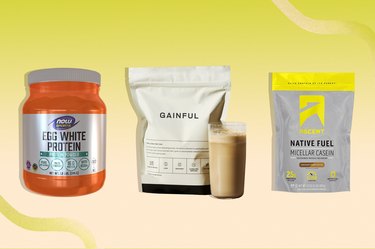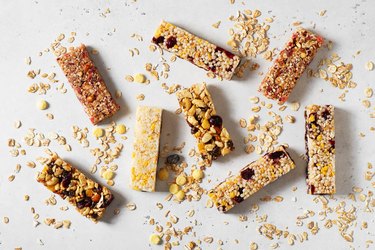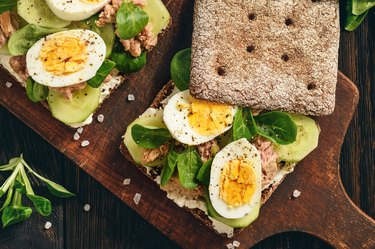
Working out consistently provides many benefits for your body including strengthening your heart, preventing chronic illnesses and supporting your immune system. But physical activity also puts stress on your body, making recovery and proper post-workout nutrition an essential part of the process.
"When we work out, the real magic happens when we aren't working out," explains Crystal Scott, RD, registered dietitian and coach at Top Coaching Nutrition. "That's when the muscles start to recover and rebuild."
Video of the Day
Video of the Day
Post-workout nutrition can help you achieve your goals like better athletic performance and muscle growth. The food you eat after working out replenishes energy levels that have been depleted and helps muscle fibers that have been torn during a workout.
"The one thing athletes and anyone who's working out tends to forget is recovery," Scott says.
The Importance of Post-Workout Nutrition
Exercise can make you stronger, faster and more conditioned, but in order for that to happen, your body needs fuel before and after workouts. Prioritizing post-workout nutrition can help your muscles recover and replace glycogen stores, according to the Mayo Clinic.
Glycogen is a form of glucose (sugar), which is the main source of energy your body draws from during exercise, per the Cleveland Clinic. It's mainly stored in your liver and muscles, and comes from eating carbohydrates.
The main macronutrients you'll want to prioritize post-workout are carbohydrates and protein. "Protein is helping build and repair muscle, so it's good to have a lean source of protein right after," says Nijya Noble, RD, founder of NK Fitness and Nutrition.
The National Academy of Sports Medicine (NASM) recommends the following:
- 1 to 1.5 grams of carbs per kilogram of body weight within 30 minutes of exercise that lasts longer than two hours. (That means, for a 160-pound person for example, you'd want to aim to eat 73 to 110 grams of carbs after exercising.)
- 15 to 25 grams of protein within 60 minutes of exercise
You can aim for those benchmarks with any high-protein, carb-rich foods you prefer. But registered dietitians recommend the following foods after exercising.
The Best Post-Workout Foods
1. Cereal and Skim Milk
You may be surprised that a classic breakfast combination like cereal and milk after a workout is a good way to replenish your body. But this meal can be beneficial after workouts because it has protein and carbs to support muscle recovery and energy. "I'd suggest making sure the cereal has enough protein in it, or to add a source of protein like milk," Noble says.
For example, one serving of Rice Krispies cereal is 22 grams of carbohydrates and 2 grams of protein, per the USDA. Pair it with one cup of skim milk and that adds 8 grams of protein, according to the USDA. "Rice Krispies are a good option too because they are relatively low in sugar. Sugar content is something to be mindful of when picking out boxed cereal," Noble says.
Some people also swear by Rice Krispies before their workout. It's thought to provide quick pre-workout energy because of its carbohydrates, but more research is needed.
2. Toast With Nut Butter and Banana
Bananas are popular with athletes because they're an easily digestible source of carbs that can help replenish the glycogen stores in your muscles, per the Mayo Clinic. They also provide several micronutrients like potassium, magnesium and vitamins C and B6, which can help prevent muscle cramps.
To make this a balanced snack, try two slices of toasted whole-wheat bread, topped with nut butter and banana. Toast will add carbs and nut butter (peanut, almond — take your pick!) will add protein and filling fat, making this a well-rounded choice.
3. Protein Powder in Oatmeal
Protein powder is a common supplement that can increase your daily protein intake. Whey protein powder is made from dairy products and high in protein, which offers the amino acids your body needs to build muscle. There are many different kinds of protein powder including whey, casein and plant-based options.
"The kind of protein powder you use depends on your diet," Noble says. "Some people have sensitivity to whey because of the dairy, so then I'd lean toward a plant-based protein powder, but they both can do the job."
Protein powder is a versatile supplement that can be added to a smoothie, oatmeal, baked goods or blended on its own with milk or water. Adding it to a source of carbs, like that oatmeal or a fruit smoothie ensures you refuel your energy stores.
"When choosing a protein powder, one serving size should be at least 20 to 30 grams of protein per scoop," Scott says.
4. Chocolate Milk
This sweet spin on milk can enhance recovery and muscle growth, according to UVA Health. It's quickly absorbed and digested in the body, providing essential amino acids your body can't make, per the Cleveland Clinic.
A one-cup serving of low-fat chocolate milk has 8 grams of protein, 30 grams of carbs and 5 grams of fat, per the USDA. It has an optimal carb-to-protein ratio of 4 to 1. This means there's an ideal mix of carbs and protein to help repair muscle tissues, help muscles grow and restore energy levels after exercising, per UVA Health.
And as an added bonus, it tastes like a sweet treat and is an affordable post-workout recovery option.
5. Greek Yogurt With Fruit
Greek yogurt after a workout is a quick source of protein and better than traditional yogurt because of its higher protein content. Plain Greek yogurt has 9 grams of protein, 4 grams of carbohydrates and 5 grams of dietary fat in about 1/3 cup, according the USDA.
"Greek yogurt is a really good post-workout snack, but it mostly hits only one macronutrient, protein, depending on the brand," Noble says. Because plain Greek yogurt is low in carbohydrates, she suggests pairing yogurt with a carb-rich topping like fruit or granola.
Some people wonder if yogurt is also a good pre-workout snack, but before a workout you want more carbs than protein, according to the NASM. Carbohydrates will immediately fuel your body for exercise, while protein takes longer to digest.
6. Protein Bars
Protein bars are convenient post-workout snacks, perfect for when you're on the go. They include all macronutrients — protein, carbohydrates and fat — but the ratios and calorie content vary depending on the brand.
For example, one Quest bar has 7 grams of fat, 22 grams of carbohydrates and 21 grams of protein, according to the USDA.
If a protein-rich meal isn't an immediate option, a protein bar can help curb your hunger and kick off your post-workout recovery, Noble says. Real food is ideal, but the high amounts of protein in a bar can hold you over until your next meal.
Just stay mindful of all the ingredients in a bar, not only the protein, Noble says. Bars that are high in sugar can be more like candy rather than a nutritious post-workout snack. And bars that aren't made with natural ingredients can be lacking high-quality nutrition compared to whole foods.
Generally, save the protein bars for after your workouts, and look for options that also include carbs. Before, focus on carb-rich pre-workout snacks.
7. Cottage Cheese With Granola
Cottage cheese has one of the best protein-to-calorie ratios. Per the USDA, a 4-ounce serving of cottage cheese has nearly 13 grams of protein, 4 grams of carbs and 5 grams of fat. Cottage cheese is also a great source of the amino acid leucine — with nearly 3 grams per 1 cup serving. Leucine is an important amino acid for building muscle, according to the Cleveland Clinic.
Add carbs to your cottage cheese snack like fresh fruit or granola for a well-rounded post-workout snack.
8. Crackers With Turkey and Cheese
For a well-balanced snack, try having whole-grain crackers paired with 3 ounces of sliced turkey breast and 1 ounce of low-fat cheese. It's the perfect combo to meet your carb and protein requirements. The saltiness of the crackers is a plus, replacing electrolytes you may have lost from sweating.
One serving of whole-wheat crackers has 3 grams of protein, 20 grams of carbohydrates and 4 grams of fat, per the USDA. (Depending on how much exercise you did, you might want more than one serving!) A 3-ounce serving of sliced turkey adds 8 grams of protein, and 1 ounce of low-fat cheddar cheese adds 7 grams of protein.
9. Post-Workout Sandwich
Sandwiches can be an easy post-workout meal because they provide carbs from the bread and protein in between. Sandwiches may also be better than pre-made meals because you can control the ingredients and macronutrient ratio by choosing different meats and bread. Or for a vegetarian option, try peanut butter.
"I love quick things like sandwiches or wraps because it's easy to mix it up and have a wide variety on the go," Noble says. "The bread has carbohydrates and then a lean source of protein can be chicken, fish, turkey or even beans. Add in a healthy fat like avocado or olive oil and you knock out all of the macronutrients."
Try these high-protein sandwich recipes after your next workout.
10. Smoothies
Blend fruit, milk, protein powder, Greek yogurt and ice, and you've got yourself an efficient combination of ideal post-workout ingredients. Smoothies are another versatile option that can be made in many different ways.
They pack in everything you need — fluids, protein and carbs. Including fruit in your smoothies is a good way to get in some micronutrients (antioxidants, vitamins and minerals). According to Scott, the best fruits to eat after a workout include:
- Berries
- Pineapple
- Bananas
- Oranges
- Watermelon
You can also pack in the protein with these smoothie recipes that don't require protein powder.
What About Pasta?
Pasta is considered a better pre-workout food because of it's high in carbs, per the Mayo Clinic. You may have heard the term "carb-loading" before, which is typically done by eating pasta before an endurance event, like running a marathon.
Pasta can be a worthwhile post-workout meal if you add a source of protein like chicken, meatballs or fish and keep an eye on your serving size.
11. Chicken and Rice
If you have time to make a full meal, chicken and rice is an option that can be prepared pretty quickly. The protein and carb combo is a powerful, whole-foods duo that can be cooked in volume ahead of time.
A standard 6-ounce serving of lean chicken breast has 54 grams of protein, per the USDA. Brown rice after a workout is a simple carbohydrate that digests quickly with 4.5 grams of protein and 45 grams of carbs in a 1-cup serving, per the USDA.
Choosing whole foods like chicken and rice provides you with fiber, vitamins and minerals — micronutrients that could be missing in processed products like a protein bar, Scott says.
"I like to remind my clients that less is more," she says. "When working toward goals, sometimes we tend to overcomplicate things. Rice can be paired with any lean protein like steak, fish, turkey and chicken. Keep it simple."
For a vegetarian option, you can also pair rice with beans. Black beans have 15 grams of protein per 1-cup serving, per the USDA.
- "Journal of the International Society of Sports Nutrition"; Cereal and Nonfat Milk Support Muscle Recovery Following Exercise; L. Kammer et al.; May 2009
- "British Journal of Nutrition"; The Acute Effects of Four Protein Meals on Insulin, Glucose, Appetite and Energy Intake in Lean Men; S. Pal, V. Ellis; Oct 2010
- JohnBerardi.com: The Importance of Post Workout Nutrition; Dr. John M. Berardi, PhD; April 2002
- LIVESTRONG.COM MyPlate: Calories in Black Beans (Ranch Style)
- "Medicine and Science in Sports and Exercise"; Milk Ingestion Stimulates Net Muscle Protein Synthesis Following Resistance Exercise; T.A. Elliot et al.; April 2006
- Mayo Clinic: "Eating and Exercise: 5 Tips to Maximize Your Workouts"
- National Academy of Sports Medicine: "Nutrient Timing: Pre and Post Workout Questions Answered!"
- United States Department of Agriculture: "Greek Yogurt (Plain)"
- Sports Medicine: "Fruit-Derived Polyphenol Supplementation for Athlete Recovery and Performance"
- Cleveland Clinic: "Amino Acids"
- Cleveland Clinic: "Should You Drink Chocolate Milk After a Workout?"
- Mayo Clinic: "Go Bananas For…Bananas"
- USDA: "PROTEIN BAR, COOKIES & CREAM"
- LIVESTRONG.COM MyPlate: Calories in Greek Yogurt % Raspberry (Chobani)








